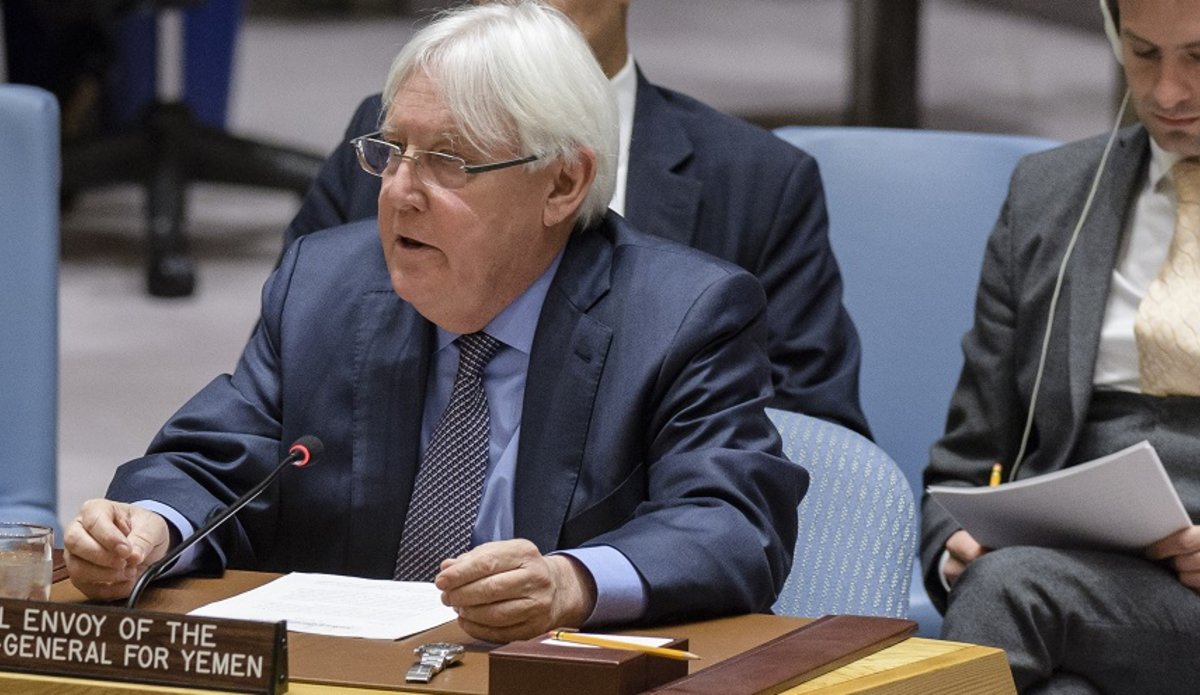Martin Griffiths, Special Envoy for Yemen makes his first briefing to the Security Council
Mr. President,
I took up my assignment as the Secretary-General's Special Envoy for Yemen. It began on 11 March. I approached this with gratitude to the Secretary-General for his trust, and a sense of privilege that I might get the chance to do something to bring this great tragedy to a belated end. Privilege coupled, I hope, with due humility in the face of the complexity and urgency of the challenge.
In the days since, those original feelings have, if anything, become stronger. I have been privileged to meet and to be guided by a wealth of Yemenis. These come from all the parties and from many civic organisations. I have taken up the time of leaders and listened as eagerly to the views of the less fortunate. As is always the case from my own experience, it has been the women who have often spoken with the greatest clarity, as well as with generosity about those they fear and those they support.
Public comment on Yemen, like on any other international tragedy, is copious and sadly often vituperative. The rhetoric on Yemen is, perhaps understandably, unforgiving and unsparing. I know, as you do, that peace becomes possible when we see the good in our foes even though we can see clearly the cruelties of war.
My emphasis on listening to and engaging Yemenis above all other priorities, is not an idle decision. We know that resolving Yemen's conflict may only come from an agreement among its leaders to put aside their differences and for them to agree to deal with them not through battle but through dialogue and debate. To put Yemenis first therefore is not merely proper and right. It is also the only way we will find peace.
In my experience of trying to resolve conflicts, I have learned to take people at their word. To trust- yes - but also to verify. We should take on trust the assurances we hear even as we know that the ultimate test is what they will deliver in practice. So when I hear positive words from one leader or another, often instantly the cause of derision and skepticism from the other side, my line is: let us take these good words and put them to good use.
My report to you today, Mr President, is a preliminary one. I will tell you what I know. And also what I fear. I will also try to identify signs of hope. My plan is to put to this Council within the next two months a framework for negotiations.
Mr. President,
There is good news and bad news. And I apologise for this cliché but it is the truth. The good news - and this is my principal message to the members of this Council today - is that a political solution to end this war is indeed available. Its outlines are no secret: the end of fighting, withdrawal of forces and handover of heavy weapons in key locations together, together, with an agreement on the establishment of an inclusive Government, one which brings the parties together in a consensus to build peace.
This can be done. All those with whom I spoke, from the widest range of the Yemeni political spectrum, have told me that they want this, that they want it quickly, that they will work with the United Nations to achieve it, and that they are conscious of the consequence, as in all agreements between enemies, that mutual concessions will be required. Let me emphasize however that a successful outcome of negotiations, never to be guaranteed, will require patience, diligence and good faith between the parties.
I have come to this general conclusion by listening to the leaders of the parties. I have assured them that what the Secretary-General wishes and what this Council requires is also what all Yemenis want: a stable and secure Yemen with a Government accountable to its citizens.
I am grateful to President Hadi for his time, his patience and his willingness to put the concerns of his people first. His Government has spared no effort to ensure I understand their positions, their needs and their willingness to engage. I count on their support, which is essential for the success of this endeavor.
I was encouraged by my meeting with the leadership of the Ansar Allah movement in Sana’a. They assured me that their movement wants an end to this war and will cooperate with the United Nations to make this happen. This message was repeated to me in several other encounters I was privileged to have with senior Ansar Allah leaders. I am greatly encouraged by this constructive attitude.
I also have heard similar views from the leaders of an exceptionally wide variety of Yemeni political parties. I am grateful to them too.
I have not yet visited the south but have started to meet southern groups. The conflict, as you can imagine, has brought about major changes on the ground in the southern governorates, and has made the long-standing frustrations and aspirations of southerners more prominent. There will be no peace in Yemen if we do not also listen to the voices of the south and make sure they are included in the political arrangements that end this war.
Mr. President,
It is no surprise that stopping a war is not at all the same as building peace. And so it goes in Yemen. We must first turn our energies to the business of stopping the war. The parties necessary for this task, this specific task, are those whose decisions can contribute to bringing an end to this war. I have been consistent in delivering the same message to them. A negotiated political settlement through inclusive intra-Yemeni dialogue is the only way to end the Yemeni conflict and address the ongoing humanitarian crisis. To this end, all parties to the conflict need to abandon preconditions to talks and grant my office unhindered, unconditional access to all relevant stakeholders, as indeed this Council asserted in a Presidential Statement earlier this year.
Building peace will be a larger task, based on different precedents and a broader participation. The National Dialogue, with its impressive record of inclusion and of civic participation will be a decisive precedent. This will be the agenda of transition, to include: reconciliation; the first item that requires our attention after a conflict; constitutional review; reconstruction and the rebuilding of state institutions. This is about transforming the state. Making this work will require the full involvement of civil society to ensure that the process goes beyond politics and reflects the aspirations of all Yemenis.
Mr. President,
I said there was good news but also bad news. There is a saying that the darkest hour is the one that comes before dawn. Let us hope this is the case. It will not be news to you that the war has, if anything, become louder and more pressing these last few weeks. I am concerned about the increased number of ballistic missiles launched towards Saudi Arabia and I note that this Council has already pronounced on this. In addition, I am concerned about the intensified military operations in Sa’ada governorate. Military confrontations and airstrikes have continued in numerous other areas of Yemen, including Sana’a, Taiz, Al-Jawf, Ma’reb, Al-Hodeidah, Hajjah, Al-Baida and Lahj governorates. The clashes continue without major changes on the front lines, but with disturbing reports of civilian casualties. We also hear, and this issue is of great importance to us, unconfirmed reports that movements of forces in Yemen are on the increase and that the prospect of intensive military operations in Al-Hodeidah, long heralded, may soon be forthcoming.
Our concern is that any of these developments would, in a single stroke, take peace off the table. I am convinced that there is a real danger of this. We all need urgently and creatively to find ways to diminish the chances of these game-changing events, upsetting and derailing the very real hopes of the great majority of Yemenis.
The people of Yemen are in desperate need of signs of hope that this war will soon end. Apart from the urgent requirement for unlimited humanitarian access, as I am sure Mark Lowcock will be referring to in a minute, there are other measures that may provide some hope. We have, for example, and with the encouragement of political leaders from all sides, been working to get Sana'a airport opened again for air traffic, and for the right of Yemenis to travel and to rejoin their families. We are also eager to arrange the release of prisoners. Both sides have told me they would like to see prisoners released. I am encouraged by this, and we will do all we can to make it happen. And I will report back to you on progress. We are also very concerned about detentions on all sides. We know from experience that the arbitrary and widespread detention of civilians in armed conflict is both a terrible abuse but also a fundamental impediment to a stable society
These are important issues. Even more important is the heroic work being done by humanitarian agencies in Yemen under the leadership of Mark Lowcock and my good friend and colleague Lise Grande.
Mr. President,
The members of this Council know better than I do the strategic importance of stability in Yemen. This is of primary importance for its people, for its neighbours, and for the wider international community. This can only be achieved by ensuring a stable Yemen, where finally terrorist activity has been eliminated and where the safety of the sea lanes can now be relied upon. Making this happen requires an effective synergy between mediation, where I have a role, and diplomacy, where you do.
Mediation without the backing of diplomacy will fail. We will do whatever we can to find agreements that work between Yemenis. But it is for the members of this Council, and other Member States, from time to time, to put the force of international opinion behind these agreements. Your unity and your resolve will be decisive.
Thank you very much.
الاحاطة باللغة العربية
 UN
UN







